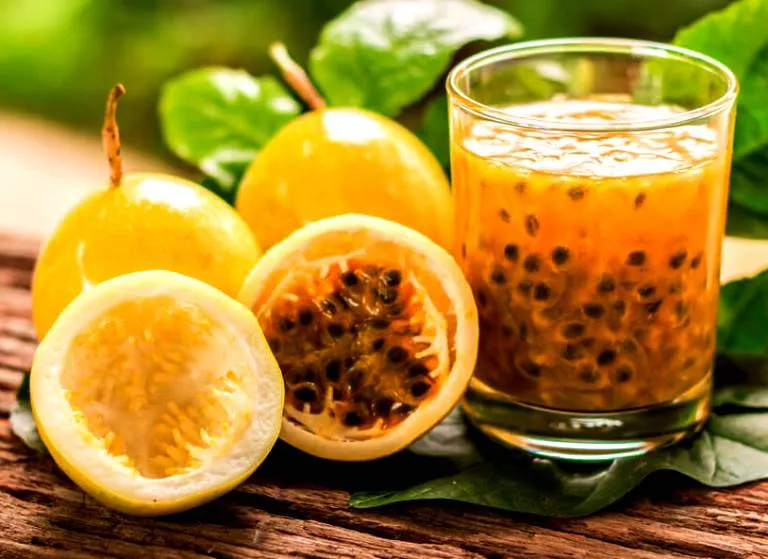Passion Fruits for a Healthy life!

Passiflora edulis or Passiflora flavicarpa commonly known as passion fruit, is a vine that mostly grows in warm climates. Passion fruits can be divided into two main types as purple passion fruit (Passiflora edulis) and yellow passion fruit (Passiflora flavicarpa). Passion fruit contains soft pulp with seeds with a hard rind. You can eat passion fruit pulp directly or you can make it a juice or add them to other fruit juices. In addition to eating passion fruit we eat young Passion leaves also.
Passion fruit is a good source of fiber, vitamin C, and vitamin A. Passion fruit also contains phosphorus, niacin, and vitamin B-6, which a healthy body needs. It’s also rich in beneficial plant compounds, including carotenoids and polyphenols. It is proved in one study that passion fruit contains more polyphenols than many other tropical fruits, including banana, lychee, mango, papaya and pineapple. Passion fruit can give you a little amount of iron as well, since it comes with vitamin C your body can easily absorb iron from passion fruit even though your body doesn’t usually absorb iron from plants very well. This enhances the body’s ability to fight off infections by boosting the immunity.
Passion fruit contains a lot of antioxidants. In particular, it’s rich in vitamin C, beta carotene, and polyphenols. Vitamin C is an important antioxidant that supports your immune system and healthy aging. Polyphenols are plant compounds which can contribute to reduce the risk of having chronic inflammation and conditions like heart disease. Vitamin A is essential for healthy eyesight. Beta carotene in passion fruit converted into vitamin A in your body. Diets rich in plant-based beta carotene have been linked to a lower risk of getting cancers in prostate, colon, stomach, and breast.
A high-fiber diet can reduce a person’s risk of heart disease by removing excess cholesterol from the inside of blood vessels. When passion fruits are eaten or drink with their pulp & seeds offers lots of fiber. Another way passion fruit can be heart healthy is that it is low in sodium and rich in potassium which supports normalizing blood pressure.
Passion fruit is a tropical fruit that has a low glycemic index. Most fruits have low Glycemic Index except Melon and Pineapple.
Scientists have linked magnesium with decreased stress and anxiety. Passion fruit is rich in magnesium, helping people manage their anxiety levels. Further studies are needed in this regard.
Generally Passion fruit allergy is rare. For people with a latex allergy can be allergic to passion fruits. People with a latex allergy should be careful when eating passion fruit until they know whether they also react to the fruit.
You can incorporate passion fruit into your daily diet as a drink, as a dessert topping, on salads and with yoghurt. If you’re looking for a nutritious and tasty snack, passion fruit is a great choice.
Author - Yashodha Jayalath
MSc in Food Science & Technology, PGIA University of Peradeniya, Sri Lanka.
BSc in Health Promotion, Rajarata University of Sri Lanka.
Pg Dip in Psychological Counselling & Psychotherapy, Institute of Psychological Studies Sri Lanka.
Associate Member of Sri Lanka National Institute of Professional Counsellors, Registration number 2015/1526